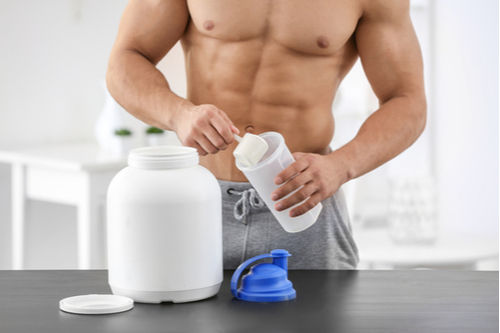- Home
- Blog
- Health & Nutrition
Whey Is Way Better Than You Think: 5 Myths Debunked
Health & Nutrition
Whey Is Way Better Than You Think: 5 Myths Debunked
By Apollo 24|7, Published on- 09 June 2022, Updated on -18 October 2022
Share this article
0
47 likes

Our health largely depends upon the nutrition we consume daily. One of the important nutrients amongst those is protein. Protein is an essential ingredient in our daily diet as it repairs damaged cells, creates new ones, and builds muscles. Athletes & sports persons need a protein-rich diet to repair the regular wear and tear their muscles go through. While our regular diet may not have enough protein, dietary supplements may help fulfil the extra requirement. In the case of protein, “Whey Protein” is the preferred choice for getting the required amount of protein.
What is Whey Protein?
Whey is the byproduct created while manufacturing cheese. Whey is the liquid content remaining after milk has been curdled. While the solid part goes for the manufacturing of cheese or tofu, the remaining protein-rich liquid part is called whey. Essentially there are two kinds of whey proteins:
- Whey protein concentrate: It is a less filtered form of whey containing around 70-80% protein. Whey protein concentrate has a lot of fat and carbohydrates and is not as pure. Therefore, it is the less expensive form of protein supplement and is best consumed before sleeping.
- Whey protein isolate: With all the carbs and fats extracted out of the supplement, whey protein isolate is almost 90% pure protein. Because of the absence of fat and carbohydrates, it gets immediately absorbed into the body. It is best-consumed post-workout.
Since many people are unaware of the health benefits of whey protein, several myths have been associated with it. Let us bust some of those.
Whey protein myths you should know about
Myth 1: Whey is not a natural supplement.
Fact: Whey is a natural byproduct produced during the manufacturing of cheese and tofu. After the milk coagulates by adding edible acids, the solid components are sent for further processing, while the remaining protein-rich liquid part is called whey.
Myth 2: Taking whey protein would make you muscular.
Fact: Whey protein alone cannot promote the growth of muscle mass. However, they aid in faster muscle healing.

Myth 3: Whey protein contains steroids.
Fact: No! Whey protein is an all-natural dietary supplement and is safe to use. On the other hand, steroids are biological substances that trigger the abnormal growth of tissue and cells in the body. Although steroids are naturally found in the body, some fitness enthusiasts consume chemically formed steroids for muscle building, which bear several side effects.
Myth 4: Whey protein can damage the kidney or liver.
Fact: There is no definite link between whey protein and liver. Furthermore, whey protein causes no harm to the liver if consumed within permissible limits. However, excessive intake of protein over an extended period can cause damage to the kidneys.
Myth 5: Whey protein causes acne.
Fact: Milk has been linked with increased acne production in various studies, hence, being a byproduct of milk, whey protein may also result in acne. Furthermore, whey protein increases the production of testosterone in the body, thereby, increasing the likelihood of developing acne. If you are prone to acne or have polycystic ovarian syndrome (PCOS), consult a dietician before adding whey protein to your diet.

Due to the myths surrounding whey protein, it has not been as popular as it should be among sports and fitness enthusiasts. But this all-natural protein supplement, whey protein, aids in muscle growth without many of the side effects, which are otherwise present in other kinds of supplements.
Have more questions?
Consult an Apollo Dietician Now
You can also buy Whey Products from our wide range.
Medically reviewed by Dr Sonia Bhatt.
Services
Health & Nutrition
Leave Comment
Services
Recommended for you

Health & Nutrition
7 Micronutrients You Should Never Miss Out On!
Though required in tiny amounts, micronutrients are essential to carry out various functions in the body. Read to know about 7 such micronutrients essential to maintain overall well-being.

Health & Nutrition
Ways to Take Care of Inflamed Winter Sinuses
Winter is many people's favorite season, but it also comes with a set of Dos and Don'ts to avoid illness. The air becomes extremely dry during this time, and our respiratory system, skin, and lips suffer as a result of the lack of moisture in the air. But do you suffer from a stuffy nose that just won't go away? Chances are, that you may be suffering from Sinusitis.

Health & Nutrition
Fight the Winter Blues with Traditional Remedies
When you observe cricket on the hearth, early departure of geese and ducks, heavy winds with dry air, heavy fog in the mornings, hair fall, and skin rashes- understand that it's time to welcome winter. They say- dark mornings, darker evenings, and chilly grey days in between mean winter is here- and with the coldest season come the winter blues!
Subscribe
Sign up for our free Health Library Daily Newsletter
Get doctor-approved health tips, news, and more.

